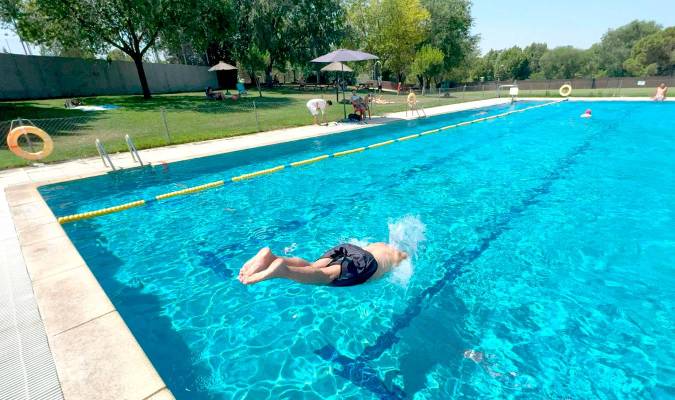Catalonia He says yes, but. The Generalitat of Catalonia will allow the filling of swimming pools with the condition that they are for public use and declared as climate refugeswhile setting a specific maximum consumption limit for tourist establishmentsof 100 liters per placein the emergency phase, as Barcelona and Girona are now.
At its weekly meeting every Tuesday, the Government has approved a new decree that will adapt the current drought regulation, at a time when A large part of Catalonia is still in an emergency phase due to drought a few months before summerthe star season for the tourism sector.
According to the Government, the threshold of 100 liters in the emergency phase it is equivalent to the domestic consumption of Catalan citizens.
Of course, this threshold for tourism will be mandatory only in municipalities where, for three months, the maximum allocations are exceeded, counting all consumption. (200 liters per inhabitant per day in emergency phase)a limit that, for example, does not exceed the city of Barcelona.
Catalonia remains in the emergency phase in most of its territory
At its weekly meeting every Tuesday, the Government has approved a new decree that will adapt the current drought regulation, at a time when a large part of Catalonia is still in an emergency phase due to drought a few months before summer, the star season. for the tourism sector.
March rains have increased the reserves of the internal basins of the order of 24.5 hectometers cubic (hm3), which has increased four percentage points to more than 18% and 125 hm3.
However, the emergency situation remains in most of the internal basin units, including the Ter Llobregat system, the largest in Catalonia and which supplies the metropolitan area of Barcelona and part of the province of Girona.
With our eyes set on summer and with the intention to balance the serious droughtthe fight against high summer temperatures and tourism, the Government has agreed to this decree that must be validated by the Permanent Deputation of the Parliament and that will be in force when published in the Official Gazette of the Generalitat of Catalonia (DOGC).
Each of the drought phases establishes a maximum consumption per person per day
Each of the drought phases establishes a maximum consumption per person per day that includes all uses of a municipality (domestic, industrial, agricultural or urban), which in the case of emergency is 200 litersbut until now there was no specific threshold for tourism, something that environmental organizations criticize.
With this new decree, the Government establishes a threshold for tourist accommodation depending on each phase: 115 liters per place in exceptionality (phase in which part of Central Catalonia and the north of Girona are in), 100 liters in emergency I (Barcelona metropolitan area and much of the east of the province of Girona) and 90 liters in emergency I (there is only the Darnius Boadella reservoir, near Figueres, in Girona).
Swimming pools as climate shelters?
Faced with a possible summer of extreme heat, city councils will carry out a census of the swimming pools that can be decreed as a climate shelter so they can be filled.
Swimming pools registered as climatic refuges may be filled in the quantities “essential to guarantee the sanitary quality of the water” and provided that safety measures are applied. additional savings that offset the water usedsuch as the closure of showers, reported the Government spokesperson, Patrícia Plaja.
The measure is designed primarily for publicly owned municipal swimming pools, but private ones could also fall into this group.
This is not the case of private ones for private use – of a single house – but those of neighborhood communities can be considered, in the event that an agreement is reached with the town hall. so that these pools can be opened to the public and are declared climate refuges.
The same thing happens with hotel or campground pools; If they want to fill in, they must reach an agreement with the city council to guarantee public use, beyond customers, and be declared as climate shelters.
What happens with mobile desalination plants?
In any case, the tourism sector has another alternative, privately owned mobile desalination plants, such as the one promoted by the hoteliers of Lloret (Girona) and for which the new decree establishes a special regime with the conditions to be authorized.
Among them, it stands out that the desalination plant is used for economic activity specifically and serves to maintain jobs, and that the hotels that benefit present a plan to save their water consumption.
As the water from mobile desalination plants is not from the network and does not reduce the availability of drinking water, the Government allows it to be used to refill swimming pools in the tourism sector that have this infrastructure.
«But if they do not have a private desalination plant and if the municipal council does not consider it a climate refuge, this summer we will see some hotels with an impractical pool, which is serious but more serious is the drought that they are experiencing. Catalonia«said the spokesperson.
Plaja has defended that the Government’s mission is to balance the needs of the economic sectors with “the citizen continuing to have water when he turns on the tap and being able to take a shower.”

